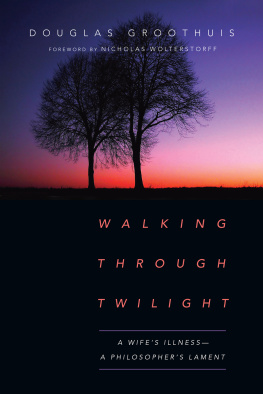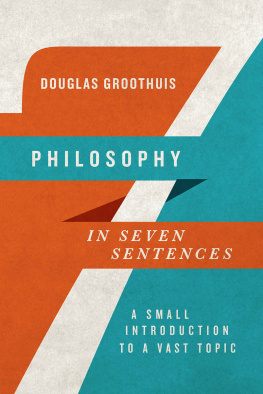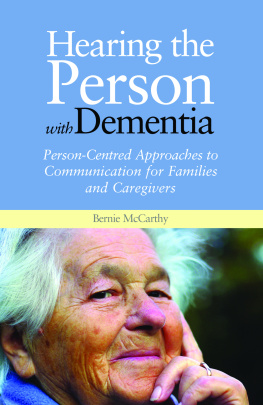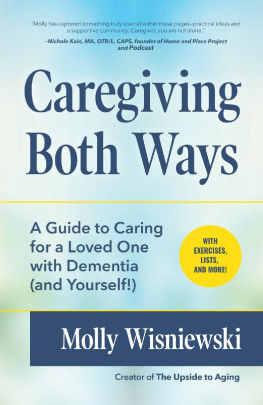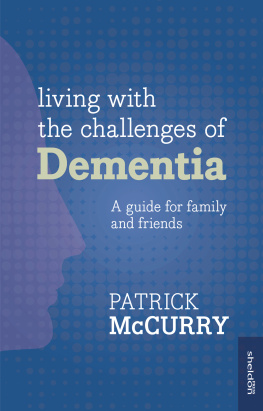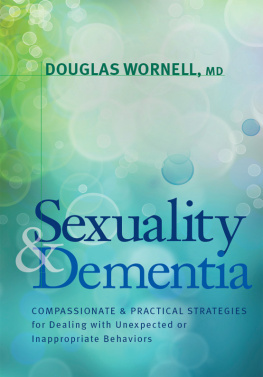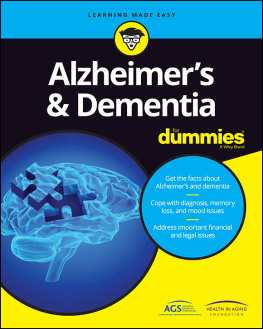Sommaire
Pagination de l'dition papier
Guide
WALKING
THROUGH
TWILIGHT
A WIFES ILLNESS
A PHILOSOPHERS LAMENT
DOUGLAS GROOTHUIS
FOREWORD BY NICHOLAS WOLTERSTORFF
InterVarsity Press
P.O. Box 1400, Downers Grove, IL 60515-1426
ivpress.com
2017 by Douglas R. Groothuis
All rights reserved. No part of this book may be reproduced in any form without written permission from InterVarsity Press.
InterVarsity Press is the book-publishing division of InterVarsity Christian Fellowship/USA, a movement of students and faculty active on campus at hundreds of universities, colleges, and schools of nursing in the United States of America, and a member movement of the International Fellowship of Evangelical Students. For information about local and regional activities, visit intervarsity.org.
All Scripture quotations, unless otherwise indicated, are taken from The Holy Bible, New International Version, NIV. Copyright 1973, 1978, 1984, 2011 by Biblica, Inc. Used by permission of Zondervan.All rights reserved worldwide. www.zondervan.com The NIV and New International Version are trademarks registered in the United States Patent and Trademark Office by Biblica, Inc.
While any stories in this book are true, some names and identifying information may have been changed to protect the privacy of individuals.
is adapted from Doug Groothuis, Learning to Lament, Journal for Baptist Theology & Ministry 10, no. 2 (fall 2013), 70-73. Used by permission.
is adapted from Douglas Groothuis, Bedeviled by My Wifes Dementia, Christianity Today, October 26, 2015. Used by permission.
Photo of Becky and Sunny courtesy of John Mervill.
Cover design: Cindy Kiple
Interior design: Daniel van Loon
Images: dramatic sunset: Ilona Wellmann / Trevillion Images
twilight landscape: bjorn 999 / iStockphoto / Getty Images
ISBN 978-0-8308-8900-6 (digital)
ISBN 978-0-8308-4518-7 (print)
This digital document has been produced by Nord Compo.
Bitter-sweet
Ah, my dear angry Lord,
Since thou dost love, yet strike;
Cast down, yet help afford;
Sure I will do the like.
I will complain, yet praise;
I will bewail, approve;
And all my sour-sweet days
I will lament and love.
GEORGE HERBERT
Foreword
NICHOLAS WOLTERSTORFF
BECKY, THE WIFE OF THE AUTHOR of this volume, was extraordinarily gifted with words. The gift began to fail her. She was diagnosed as suffering from primary progressive aphasia, a form of dementia that has, as one of its primary signs of mental deterioration, the inability of the person to find words to say what she wants to say. Walking Through Twilight is the authors lament for the wide and deep losses that this ravaging disease has wreaked in his life and that of his wife. He does not wallow in the horror of the disease, but neither does he gloss over it or look away. He does not flinch from the painful reality.
Walking Through Twilight is more, however, than an unfailingly honest lament over loss. Interspersed with Groothuiss lament is a series of meditations, evoked by observing the nature and course of the disease, and his response and that of others, whose aim is to understand something of the hand of God in this valley of suffering and to discern how to live lovingly and faithfully in this shadowy place.
Groothuis is a philosopher and theologian, steeped in Scripture. So the meditations are, as one would expect, philosophical and theological in their overall character, and richincredibly richin their incorporation of passages from Scripture, especially from the wisdom literature of the Old Testament. But the meditations are never abstract. In each instance they are tied to the authors observation of his wifes suffering, and his response and that of others. The image that comes to mind is that of a cord on which beads are strungbeads of reflection strung on a cord of lament over loss.
And what an astute observer Groothuis is! Soon after his wifes diagnosis became known, he noticed that people began to speak differently to her. They would raise their voice, lapse into sing-song and upward inflection, and refer to her in terms they would never use for any right-minded adultterms like hon or dear or other inapt terms of awkward endearment. In short, they would speak to her condescendingly. That observation leads Groothuis into a lovely meditation on what is wrong with speaking condescendingly to such a personor, indeed, to any personand how to speak to such a person instead.
Another example: he notes that he still laughs and wonders whether, in this sea of loss, its appropriate for him to laugh. And he observes that his wife also still laughs, though what she laughs at has changed significantly. She no longer laughs at jokes; she doesnt get the point. The meditation closes with these poignant words: Proverbs lauds the wise and hard-working woman. She can laugh at the days to come (Proverbs 31:25). Becky cannot laugh at the days to come, but in these daysor at least some of themlaughter will come to both of us.
One more example: the author found himself getting intensely angry at the way in which some members of the medical profession treated Becky, especially at the way in which she was treated in a behavioral health unitand at the way he was treated. This leads him into a probing meditation on the role of anger in life. He also finds himself getting angry with God. And this leads him to reflect on whether it is right, sometimes, for a Christian to be angry with God. Does anger at God have a place in the Christian life?
These examples illustrate the point that the author does not stop with lament over loss but over and again looks ahead by reflecting on how to live well amidst this loss. The title and subtitle say it all: a philosophers lament over his wifes illness intertwined with reflections on how to walk through this twilight. The examples also illustrate another distinctive feature of the book: the specific and the general are seamlessly interwoven. Observation of the specific evokes reflection, reflection illuminates the specific.
Introduction
WALKING
THROUGH TWILIGHT
Hope deferred makes the heart sick,
but a longing fulfilled is a tree of life.
PROVERBS 13:12
SINCE I WAS RELEASED from graduate school, no one has told me what to write. After my doctoral committee accepted my dissertation in 1993, I have written books, articles, editorials, reviews, and letters to the editor. Perhaps I am spoiled, but I work hard at my writing. Writing for me is not therapeutic. I have never written merely to make money or express myself (a common curse inflicted by egotists on readers). I have been reluctant to write a memoir. The task of extending the knowledge of God, defending the faith that was once for all entrusted to Gods holy people (Jude 3), and applying the Christian worldview to the whole of life has been my passion, however flawed my efforts. But perhaps I can combine memoir, lament, and philosophical reflection.
Most of my work responds to attacks on Christianity or to corruptions within it. Becky was there near the beginning. We met in 1983 when we worked for a campus ministry. As we got to know each other and fell in love, she encouraged two things that changed my life for the better. First, she convinced me that the time was over for research and that I should begin writing my first book. Second, she offered to edit the chapters as I went along. That book,

